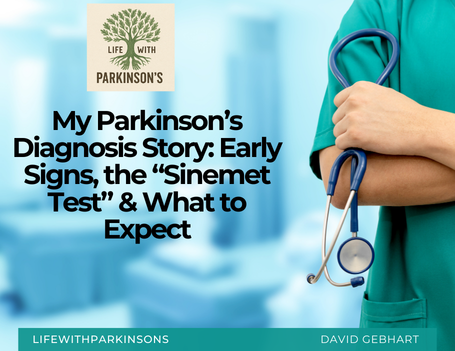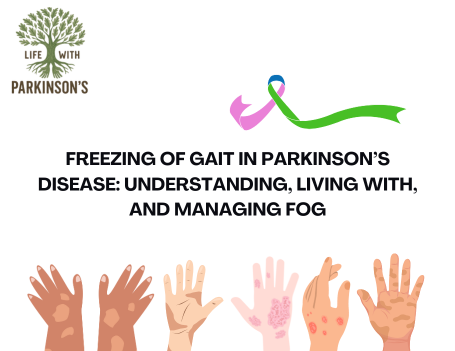When I was diagnosed with Parkinson’s disease, it was one of the most confusing and difficult times of my life. Looking back now—more than eight and a half years later—I can see three things that I truly wish I had understood better at the time. Knowing them wouldn’t have changed the fact that I have Parkinson’s, but it would have made my life—and my mindset—so much easier in those early days.
Hi, it’s David from Life With Parkinson’s. If you’re new here, welcome. I’m really glad you’re here. To those who’ve been following along—thank you for your continued love and support. This topic has been on my heart for a while, and I hope what I share here helps you or someone you love navigating those first uncertain steps after diagnosis.
1. The Honeymoon Stage: A Time to Breathe and Reclaim Joy
When I first heard the words “You have Parkinson’s disease,” everything around me went quiet. My mind was spinning, my body was tense, and my heart sank into my stomach. I didn’t fully grasp what those words meant for my future—but I knew my life had changed forever.
My movement disorder specialist told my wife, Hayley, and me that it would take at least two years to process the shock of my diagnosis. He was right. It really did take that long. During that time, I was grieving—the loss of who I was, the life I thought I’d have, and the certainty that once came with my body doing what I told it to do.
I spent those first few years trying to make sense of everything—working through what I call my “seven stages of grief” and just trying to keep my head above water. What I couldn’t appreciate then was something many people call the Parkinson’s honeymoon stage.
The honeymoon stage is a period of relative stability right after diagnosis—usually lasting three to five years. It begins once you start medication, when your symptoms improve, your mobility returns, and life starts to feel somewhat “normal” again.
But because Parkinson’s is a progressive disease, this stage doesn’t last forever. The disease continues to move quietly in the background, even when you’re feeling okay.
At the time, I was so focused on what I’d lost that I didn’t recognize what I’d gained—a window of opportunity. The medication gave me my life back for a while, and I wish I had used that time differently. Instead of preparing for early retirement and trying to plan for everything that could go wrong, I wish I had planned for something that could go right.
If I could go back, I’d tell myself:
“David, take that trip. Go on that hike. Cross something off your bucket list. You’ll have time to grieve later—right now, use this energy to live.”
When people newly diagnosed ask me for advice today, I tell them exactly that.
If you’re in your honeymoon stage, do something fun. Travel while it’s easier to travel. Spend time with people you love. Make memories that will carry you through the tougher days ahead.
This stage isn’t just about physical relief—it’s a gift of perspective. It reminds us that Parkinson’s doesn’t get to define our joy unless we let it.
2. The Promises We Make: Why Self-Compassion Matters More Than Perfection
The second lesson I’ve learned is about the promises we make—to ourselves and to others—that we simply can’t always keep.
When life is good, it’s easy to make promises: “I’ll always stay positive.” “I’ll eat better.” “I’ll never give up.”
But when life turns difficult—when Parkinson’s symptoms flare, or fatigue sets in, or cognitive changes make even simple tasks challenging—those promises become harder to keep.
And breaking them can hurt deeply.
Our self-esteem often lives and dies by the promises we make. When we can’t keep up with our own expectations, we start to feel like we’re letting people down—and letting ourselves down too. That guilt can spiral into shame, frustration, or even self-doubt.
I’ve seen this pattern not just in myself but in many others on their Parkinson’s journey. We all ask the same questions at some point:
“What happened to me?”
“Why can’t I do what I used to?”
“Why does my body feel like it’s not mine anymore?”
But here’s what I’ve learned—it’s okay if you can’t keep every promise. Parkinson’s changes the rules of the game. The promises we make before and after diagnosis are not the same.
The truth is, life with Parkinson’s requires flexibility, forgiveness, and honesty. Instead of saying “I’ll never miss a workout,” maybe it’s “I’ll move my body in a way that feels right for me today.” Instead of “I’ll always stay positive,” it’s “I’ll allow myself to feel what I feel—but I’ll keep going anyway.”
When we set realistic promises rooted in compassion, we give ourselves room to adapt. And adaptation is how we survive and thrive.
So if you’ve broken a few promises to yourself lately, you’re not failing—you’re learning to live with Parkinson’s in a real and sustainable way.
3. Acceptance: The Courage to Live Fully With Parkinson’s
The third thing I wish I’d understood earlier is what acceptance truly means.
When I talk about acceptance, I don’t mean giving up. I don’t mean saying, “Well, I’ve got Parkinson’s—guess that’s it for me.” That’s not acceptance—that’s surrender.
True acceptance is looking reality in the face and saying, “This is my life now, and I’m still going to live it.”
It means understanding that yes, Parkinson’s is here to stay—but so are you. It means fighting back in your own way, every day, whether that’s through exercise, medication, mindset, or community support.
There’s something deeply human about this resistance—the drive to fight for your life, your identity, and your joy. We cheer for the underdog in every movie because we are the underdog. And every time you get out of bed, every time you choose to move, every time you choose to smile—you’re fighting back.
Parkinson’s doesn’t take a day off. Not for holidays, not for birthdays, not even for sick days. It’s there, every morning, waiting for you. But so is your courage.
And the truth is, acceptance and resistance aren’t opposites—they’re partners. Acceptance says, “This is what I’m facing.” Resistance says, “And I’m going to do something about it.”
Those who find that balance—who accept what is and still fight for what can be—deserve a gold medal in my book.
So if you’re reading this and you’re in that place right now—somewhere between heartbreak and hope—just know that you’re not alone. We’re in this together, fighting one day at a time.
A Note for Caregivers
If you’re supporting someone with Parkinson’s, thank you. You are the backbone of this community. Remember that your loved one’s fight is also your fight—but it’s okay to rest, to cry, to ask for help. Your well-being matters just as much as theirs.
The promises you make—to stay patient, to stay strong, to stay positive—are heavy ones. Be gentle with yourself, too.
Support This Work
If you’ve found comfort or strength in this story, please consider supporting my work on Ko-fi. Every contribution helps me continue creating content for others living with Parkinson’s and their caregivers.
Your support means the world—it helps keep this community going.
Medical Disclaimer
I’m not a medical professional. Everything I share here is based on my personal experience living with Parkinson’s. This blog is not intended to replace professional medical advice, diagnosis, or treatment.
Always consult with your doctor, neurologist, or movement disorder specialist before making changes to your medication, exercise, or treatment plan.
Final Thoughts
If I could go back to my diagnosis day, I’d tell that confused, scared version of myself three simple things:
- Embrace the honeymoon stage. Use it to live, not to plan your exit.
- Be gentle with the promises you make. Life will change, and that’s okay.
- Accept your reality—but never stop fighting for your joy.
Parkinson’s has changed my life in countless ways, but it’s also given me perspective, purpose, and a community I’m endlessly grateful for.
Thank you for walking this path with me. Please share this post with someone newly diagnosed or a caregiver who might need to hear these words today.
Together, we can face each day with courage, hope, and a little bit of grace.




